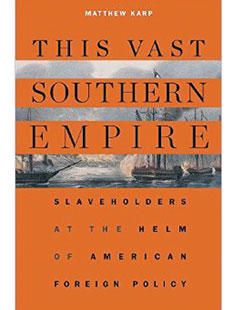
“Much of the older literature on the antebellum period assumes that by the mid-19th century, slavery was an anachronism,” said assistant professor of history Matthew Karp. “But Southern slaveholders saw this racially organized, coercive labor as the endgame of human world development.”
Understanding how these government officials aimed to extend the reach of slavery domestically and internationally is the focus of Karp’s book, This Vast Southern Empire: Slaveholders at the Helm of American Foreign Policy (Harvard University Press). Karp examines how slaveholders paid close attention to the politics of slavery and abolition across Europe and the Americas. By the 1850s, the productivity of slave agriculture in the United States, Brazil, and Cuba helped convince Southern leaders that the modern world economy was dependent on enslaved labor.

Karp’s research came amid a wave of new inquiry into international development in American history. The Civil War, which is usually considered in a domestic context, was ripe for study. In researching the book, Karp relied on new interpretations of old documents: “When I read [Secretary of the Navy] Abel Upshur [1807]’s report in December 1841, I asked myself: ‘Why was this Virginian quadrupling the size of the Navy overnight?’ That doesn’t compute with anything we know about the Virginia tradition of Thomas Jefferson, who wanted a very small Navy.” Karp believes that the international politics of slavery answers this question.
Karp focuses on a small group of Southern elites, including plantation owners Upshur and Vice President John C. Calhoun, whose unyielding views on the propriety of slavery were dominant among the larger class. These slaveholders used modern methods, from the telegraph to the railroad, to communicate and to build solidarity.
“Slaveholders were plugged in to international debates about slavery and emancipation,” said Karp. “But those characteristics still did not mean that they perceived slavery as a social ill. On the contrary, I think slaveholders’ worldliness contributed to their confidence about slavery.”
The entrenchment of slavery in every aspect of Southern life made the eventual Civil War so fearsome: “The Republican Party’s claim that slavery was a ‘relic of barbarism’ was a radical thing to say in the context of the 1850s,” said Karp. “It cut at such a fundamental pillar of American politics across the early 19th century. Slaveholders were horrified. People say that the parties are becoming more ideologically polarized today, but I don’t think we’re at the level of 1858 just yet.”











No responses yet